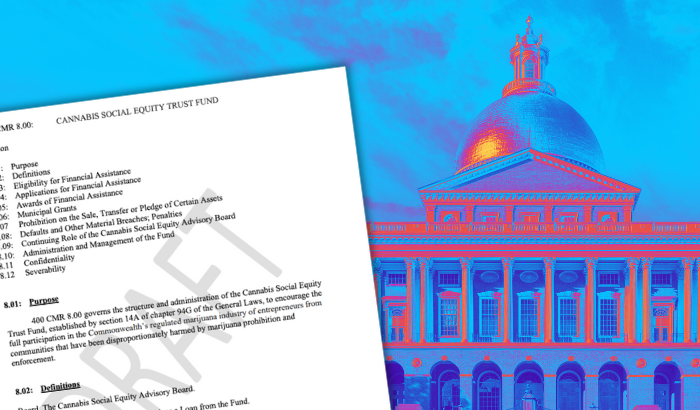
“It’s really important to move on this as fast as possible—everyone keeps saying that there’s not enough operating capital out there.”
After months of wrangling, let-downs, and stakeholder anticipation, last week the state Executive Office of Economic Development (EOED) published a draft of the regulations that will govern the Cannabis Social Equity Trust Fund.
It’s been a slog to get to this point. In 2022, Massachusetts lawmakers established a Cannabis Social Equity Advisory Board “to advise the Executive Office of Economic Development (EOED) as EOED administers the Cannabis Social Equity Trust Fund.” But last June, members of that CSEAB were outraged to learn that the fund, which was established to help disadvantaged applicants, will yield tens of millions of dollars less than expected in its first year.
There’s also been a wait for funding and specifics, which was further complicated by problems transferring the actual money for the program from a so-called Marijuana Regulation Fund to the Cannabis Social Equity Trust Fund.
They’re not out of the woods yet. At a hearing last Friday for the administering EOED to field input on their draft fund regulations, many open questions remained while potential applicants voiced concern over various proposed details.
Chris Fevry of Your Green Package commented on the section about “Prohibition on the Sale, Transfer or Pledge of Certain Assets.” Along with others, he’s concerned about restrictions that would prevent fund recipients from selling their businesses.
Ryan Dominguez, a new CSEAB appointee from Mass CultivateED, which provides “job training in the Massachusetts cannabis industry for individuals impacted by the failed War on Drugs,” suggested adding “a mechanism for private dollars to come into the fund so that we can grow the pilot a little bit.”
“The tax dollars can vary from year to year,” Dominguez said, “so the way that we can supplement the fund is by getting people from the industry to give to the fund and seeking philanthropy.”
Devin Alexander of Rolling Releaf questioned the loan fund’s application costs. “I find that redundant,” he said, considering that a central feature of the Cannabis Control Commission’s Social Equity Program is the reduction or waiving of such fees.
In other comments, some licensees who are stuck in the provisional phase said businesses like theirs may be short on cash on account of struggling to open for years, in some cases paying expensive leases and enduring other costs, and may not be able to meet the basic financial requirements.
Also, some people testifying questioned why the program will include loans at all, as opposed to being entirely grant-powered. As the draft regulations currently read: “EOED shall determine if Financial Assistance shall be provided in the form of grants or loans, which may include direct grants, recoverable grants, low-interest loans, forgivable loans, loan guarantees or other credit enhancements, or other forms of direct or indirect financial support.”
Philip Smith of Freshly Baked Company said, “It should be a grant—I’m not sure why anyone would need the loan.” He also commented on the section addressing “Defaults and Other Material Breaches; Penalties,” asking, “Why would they be taking a license away from an equity operator if they can’t pay back a loan?” Jeff Similien of Lowkey Dispensary in Dorchester also spoke in favor of a grant program and working capital.
Shekia Scott suggested “broadening the range of individuals who would be considered” for assistance. Scott is the Cannabis Business Manager in the Boston Mayor’s Office of Economic Opportunity and Inclusion, but spoke on behalf of herself. Specifically, she would like to see the inclusion of those who are “actively engaged in efforts to enhance equity” through municipal cannabis equity programs.
Mostly, those testifying asked for details about when loans will be given out. To which they were told, once again, “That information will be coming soon.”
“My comments are around the timeline of things,” Ruben Seyde of Delivered Inc. said at the hearing. “I just think it’s really important to move on this as fast as possible—everyone keeps saying that there’s not enough operating capital out there.”
As of the Dec. 14, 2023 CCC meeting, of 1,533 total applications approved by the commission, 113 were Economic Empowerment applicants, while 320 qualified under the Social Equity Program, and 239 were Disadvantaged Business Enterprises—with 2023 numbers that represented scant improvement over the previous year. Of the 608 businesses that commenced operations by Dec. 14, 25 were EE, 42 were SE, and 74 were DBEs.

























